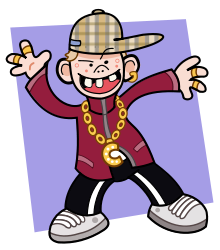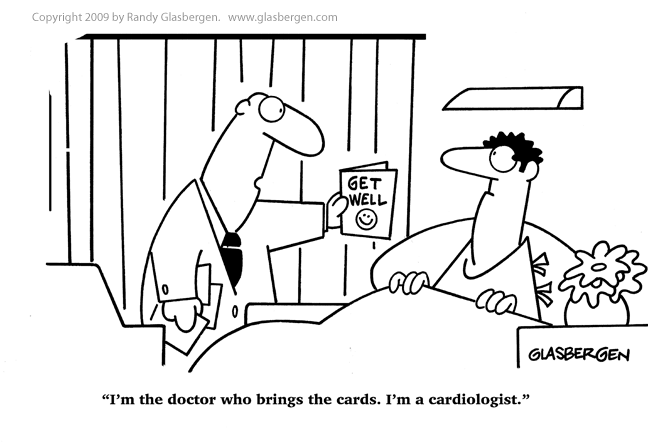Hi,
I got to get very involved in a number of clinics this week, which I really enjoyed. Unfortunately, because I am being so involved, I have plenty of opportunity room to make mistakes. Fortunately neither of the mistakes I made this week were severe, but both are definitely things I can learn from, and one was something that could turn out quite seriously in different circumstances.
Studying or practising medicine is all about learning what to do and what not to do (pretty much like anything else). The easiest way to learn seems to be by making a mistake or saying something stupid yourself, then being so embarrassed by what you have done or said that you will forever remember that moment, and thus forever remember the correct answer. Medical education used to be based a lot more around the 'make them feel stupid' school of teaching, and most universities and consultants have moved on from this now, seeing it as cruel! Despite the fact that this ritual humiliation is no longer used as a method of teaching (by most people), making mistakes is always going to happen. While mistakes are going to be unavoidable, I think the hope is that you are taught enough to avoid serious mistakes, and the minor mistakes you do make, you either make early enough to have someone senior be able to cover for you, or are so minor that they don't endanger patients.
Missing something serious, such as a sign of cancer may end up killing someone...
The first mistake involved a confusion over names. When calling out the next patient to come and see me in the waiting room, I called out "Gladys Burr". An elderly lady stood up, and I walked her and her husband to the consultation room, where I then proceeded to chat away with them about the problem she had come in with. She was talking about a changing mole she wanted to be looked at, so I asked all the standard questions (is it changing, what other symptoms, history of sun exposure and so on) and then examined it. To my surprise the mole looked different to how the GP had described it, as he had described it as being small, irregular and being darkly pigmented (fear of melanoma) whereas to me it looked brownish, large and pearly, possibly being a basal-cell-carcinoma. Whilst looking in the notes I noticed that this sprightly lady who enjoyed hill walking had a DNAR (do not attempt resuscitation) form filled in in the front. I was surprised by this as she seemed very healthy, but didn't mention it. When presenting this patient to the registrar he decided he wanted the consultant to look at the changing mole, so went to get her. The consultant knew the patient as she had seen her before, and chatted away with her, before telling us she wanted to see the notes. Ignoring the ones I held out, she whisked outside, got a different set and came back. After flicking through them briefly she told us it was something she would want to have biopsied and left. Confused, I looked at the notes the consultant had taken, which were for a patient called "Gladys Furr". Here the referral letter from the GP explained the legion as we saw it, and there was no DNAR form in the front. I had been writing in the wrong set of notes the whole time! Here, there was little damage done as I could transcribe what I had written across and rip out the wrong page. I can imagine that getting patients mixed up at other times could be much more serious though, such as before operations. This is why we should always ask about birth dates! Fortunately the registrar I was working with just found it funny that there were two so similarly named people and while the earlier one had not yet arrived, the later one had and had heard what she thought was her name for the consultation. I know I will be careful in the future with this now!
The second mistake was more of a waste of a time than a mistake. Before consulting one patient I flicked through the notes, but couldn't find the letter from the GP that is always sent with each patient, explaining why the patient has been sent to the dermatology clinic. Not wanting to waste more time, as we were running behind, I decided to just see the patient anyway and get them to tell me their story. Unfortunately this was a bit of a mistake. The lady was 99 years old and appeared very spry for her age, joking and flirting away on the way to the consultation room. However, when I asked her what the matter was she told me she had a lump on her foot, taking her shoe off to show me hallux valgus (a bunion). I asked her if this was what she had been sent to us with, and she said that it must be, as she didn't have any problems, but she doesn't really see her GP at all. She reported no medical problems and told me she wasn't taking any drugs, so I just took a history of her bunion, though the consultation seemed to be going around in circles, giving me the feeling that she was not quite thinking straight. This took some time, and as I was wrapping up, the dermatologist came in to see me and the patient (normally I would go to them, present the patient and then bring them back to see the patient, but I had taken far too much time here). I explained the situation, so he flopped open the notes, and they immediately opened on the referral letter from the GP which had been stuffed into the middle of them. What luck... It turns out she had what looked like a malignant melanoma on her back, which the GP had seen while treating her for a problem with her stomach. All things that she hadn't mentioned bit when the consultant ran over them, agreed with "oh yes, that's right". I looked like a real fool! Next time, I don't think I will want to see the patient without the referral letter!
Other than these two mistakes I made, I had a pretty productive week. I was very involved in the clinics, hence why I was able to make these mistakes, effectively seeing patients and planning management myself, consulting with the consultant during, obviously, to make sure my diagnosis and management plans were correct. For example, one patient who came in had a strange rash all over his legs, which looked a little like the picture below:
A picture showing a similar rash to the one the patient I saw had
I talked to this patient and took a good history, mainly asking about changes in the environment at home, changes in medication and whether he had had a sore throat in the past. This was because the rash looks like a vasculitis, a ash caused by the inflammation of blood vessels. This can be caused by a number of things, such as an allergic reaction to something (such as drugs or an insect sting); or a streptococcal infection where the toxins released inflame the blood vessels. Here, working out the cause of the rash is important as that way it can be avoided or treated. After talking to him and excluding obvious causes from the history, I then make a plan as to what to do next and talk to the dermatologist, who agrees with everything I have planned to do, and tells me to get on with it. Get on with it I do, and I take a throat swab for streptococcal infection and bloods to look at the immune system and look for viruses (which I get first time, which is fortunate as the poor man nearly faints when the needle goes in [then again, who does like needles!]) The dermatologist also wants a skin biopsy to send for histology, which I help them take whilst explaining the process to him. I then help talk him through all the possibilities and what will be done next. Its as though I have my own patients! I really enjoy this interactive way of learning - it reminds me of my elective in Tanzania where I had to run the outpatients, but at least this time I have the safety net of the consultant peering over my shoulder so everything (hopefully) gets done right!









